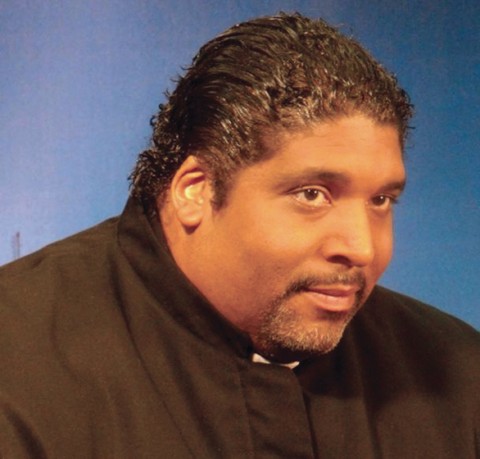Disobedience for racial justice

Read the main article on school integration in North Carolina.
William Barber has a way of getting people arrested. Over the past five years as president of the North Carolina chapter of the NAACP, Barber has revitalized the organization and risen to prominence as a civil rights leader. He was a speaker at the NAACP's annual meeting in Los Angeles this past summer, and his fight against resegregation in North Carolina schools has made national headlines.
Since he took charge of the NAACP in North Carolina, he's been inspiring followers—black and white—to engage in acts of civil disobedience.
Barber himself was arrested in 2010 at a meeting of the Wake County School Board, where a newly elected majority had been working to eliminate the school district's socioeconomic diversity policy. In May 2011 he was arrested again along with six other protesters after being charged with disorderly conduct at a session of the North Carolina General Assembly. Barber was in the gallery of the assembly shouting support for the Racial Justice Act, public education funding, unemployment benefits, several voting rights initiatives, funding for the disabled, public health clinics and indigent legal aid.
Read our latest issue or browse back issues.
Among those arrested with Barber was David LaMotte, a consultant on peace and justice for the North Carolina Council of Churches. "I'm not in the habit of getting arrested. That's the first time I've ever taken that stand," said LaMotte. "It's really hard to listen to [Barber] speak and not be moved. Some people give information but don't invite you to care, some move you but don't give information to act. He really does both, and that's a rare treasure."
Jonathan Wilson-Hartgrove, who has also engaged in acts of civil disobedience, met Barber in the summer of 1997 at a conference for aspiring young politicians sponsored by Governor Jim Hunt, who had appointed Barber head of the state's Human Relations Commission. The meeting changed the direction of Wilson-Hartgrove's life. He spent the next fall as a page for Senator Strom Thurmond but then heard a call to live simply and work for social justice.
"I remember being attracted to the power of his ministry as a different kind of power," said Wilson-Hartgrove. "It struck me as the power of the Holy Spirit."
Barber grew up as a preacher's kid in eastern North Carolina. His father, William Barber Sr., was one of the first black science teachers and his mother the first black secretary in the integrated Washington County public schools. Growing up, Barber watched his father organize against police brutality and saw his mother give free piano lessons.
Barber believes that his parents felt they had an obligation not to escape their community but to help it.
"My parents made a faithful decision," he said. "It was a part of their sacrificial commitment to the cause of Christ. They did that with the hope that things would get better. I don't know how to be a Christian without a deep commitment to justice."
Barber recalls guarding the back door of his uncle's house with a shotgun after the Ku Klux Klan burned a cross in the front yard.
Despite a chronic back problem that leaves his massive frame hunched and makes standing difficult, Barber works in the trenches for social justice. In his hometown of Goldsboro, Barber's Rebuilding Broken Places Community Development Corporation has developed low-income housing, affordable childcare and computer training for adults.
"It's hard for me to argue against diversity when I'm the result of it," he said. "When they want to defund public education, I take it personally. You're actually desecrating the sacrifices of black and whites who worked hard and literally gave their lives to move us forward."





